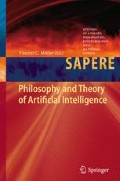Abstract
After a short assessment of the idea behind the Turing Test, its actual status and the overall role it played within AI, I propose a computational cognitive modeling-inspired decomposition of the Turing test as classical “strong AI benchmark” into at least four intermediary testing scenarios: a test for natural language understanding, an evaluation of the performance in emulating human-style rationality, an assessment of creativity-related capacities, and a measure of performance on natural language production of an AI system. I also shortly reflect on advantages and disadvantages of the approach, and conclude with some hints and proposals for further work on the topic.
Access this chapter
Tax calculation will be finalised at checkout
Purchases are for personal use only
Preview
Unable to display preview. Download preview PDF.
References
Besold, T.R.: Rationality in/through/for AI. In: Romportl, J., Ircing, P., Zackova, E., Schuster, R., Polak, M. (eds.) Proceedings of Extended Abstracts Presented at the International Conference Beyond AI 2011 (2011)
Besold, T.R., Gust, H., Krumnack, U., Abdel-Fattah, A., Schmidt, M., Kühnberger, K.: An Argument for an Analogical Perspective on Rationality & Decision-Making. In: van Eijck, J., Verbrugge, R. (eds.) Proceedings of the Workshop on Reasoning About Other Minds: Logical and Cognitive Perspectives (RAOM-2011), CEUR Workshop Proceedings, Groningen, The Netherlands, vol. 751, CEUR-WS.org (2011)
Bishop, M., Preston, J. (eds.): Essays on Searle’s Chinese Room Argument. Oxford University Press (2001)
Brachman, R.: (AA)AI - More than the Sum of its Parts. AI Magazine 27(4), 19–34 (2005)
Cassell, J.: More than just another pretty face: Embodied conversational interface agents. Communications of the ACM 43(4), 70–78 (2000)
Chomsky, N.: Reflections on Language. Pantheon Books (1975)
Cohen, P.: If Not Turing’s Test, Then What? AI Magazine 26(4) (2006)
Colby, K.: Modeling a paranoid mind. Behavioral and Brain Sciences 4(4), 515–534 (1981)
Colton, S., Lopez de Mantaras, R., Stock, O.: Computational Creativity: Coming of Age. AI Magazine 30(3), 11–14 (2009)
Elman, J.: Finding structure in time. Cognitive Science 14, 179–211 (1990)
Fellbaum, C.: WordNet and wordnets. In: Encyclopedia of Language and Linguistics, pp. 665–670. Elsevier, Oxford (2005)
Ferrucci, D., Brown, E., Chu-Carroll, J., Fan, J., Gondek, D., Kalyanpur, A., Lally, A., Murdock, J., Nyberg, E., Prager, J., Schlaefer, N., Welty, C.: Building Watson: An Overview of the DeepQA Project. AI Magazine 31(3), 59–79 (2010)
Gazdar, G., Klein, E., Pullum, G., Sag, I.: Generalized Phrase Structure Grammar. Blackwell, Malden (1985)
Gilboa, I.: Questions in decision theory. Annual Reviews in Economics 2, 1–19 (2010)
Harnad, S.: Other bodies, other minds: A machine incarnation of an old philosophical problem. Minds and Machines 1, 45–54 (1991)
Harnad, S.: Minds, Machines and Turing. Journal of Logic, Language and Information 9(4), 425–445 (2000)
Harnad, S.: The Annotation Game: On Turing (1950) on Computing, Machinery, and Intelligence. In: The Turing Test Sourcebook: Philosophical and Methodological Issues in the Quest for the Thinking Computer. Klewer (2004)
Hauser, L.: Searle’s Chinese Box: Debunking the Chinese Room Argument. Minds and Machines 7, 199–226 (1997)
Lewis, J., Elman, J.: Learnability and the statistical structure of language: Poverty of stimulus arguments revisited. In: Proceedings of the 26th Annual Boston University Conference on Language Development (2001)
Loebner, H.: The Loebner Prize. Official homepage of the Loebner Prize Competition, (queried July 28, 2011), http://www.loebner.net/Prizef/loebner-prize.html
Moor, J. (ed.): The Turing Test: The Elusive Standard of Artificial Intelligence. Kluwer Academic Publishers, Dordrecht (2003)
Mueller, S.T.: Is the Turing Test Still Relevant? A Plan for Developing the Cognitive Decathlon to Test Intelligent Embodied Behavior. In: 19th Midwest Artificial Intelligence and Cognitive Science Conference, MAICS (2008)
Pollard, C., Sag, I.: Head-Driven Phrase Structure Grammar. Studies in Contemporary Linguistics. University of Chicago Press, Chicago (1994)
Pollock, J.: Twenty Epistemological Self-profiles: John Pollock (Epistemology, Rationality and Cognition). In: A Companion to Epistemology, pp. 178–185. John Wiley and Sons (2010)
Schmidhuber, J.: Formal theory of creativity, fun, and intrinsic motivation (1990-2010). IEEE Transactions on Autonomous Mental Development 2(3), 230–247 (2010)
Searle, J.: Minds, Brains and Programs. Behavioral and Brain Sciences 3(3), 417–457 (1980)
Shieber, S.: Lessons from a restricted Turing Test. Communications of the ACM 37, 70–78 (1994)
Trebek, A., Barsocchini, P., Griffin, M.: The Jeopardy! Book. Harper Perennial (1990)
Tsourikov, V.: Inventive machine: Second generation. AI & Society 7, 62–77 (1993)
Turing, A.: Computing Machinery and Intelligence. Mind LIX (236), 433–460 (1950)
Wang, P., Goertzel, B.: Introduction: Aspects of Artificial General Intelligence. In: Goertzel, B., Wang, P. (eds.) Advances in Artificial General Intelligence: Concepts, Architectures and Algorithms - Proceedings of the AGI Workshop 2006, Frontiers in Artificial Intelligence and Applications, vol. 157, pp. 1–16. IOS Press (2007)
Weizenbaum, J.: ELIZA - a computer program for the study of natural language communication between man and machine. Communications of the ACM 9(1), 36–45 (1966)
Author information
Authors and Affiliations
Corresponding author
Editor information
Editors and Affiliations
Rights and permissions
Copyright information
© 2013 Springer-Verlag GmbH Berlin Heidelberg
About this chapter
Cite this chapter
Besold, T.R. (2013). Turing Revisited: A Cognitively-Inspired Decomposition. In: Müller, V. (eds) Philosophy and Theory of Artificial Intelligence. Studies in Applied Philosophy, Epistemology and Rational Ethics, vol 5. Springer, Berlin, Heidelberg. https://doi.org/10.1007/978-3-642-31674-6_9
Download citation
DOI: https://doi.org/10.1007/978-3-642-31674-6_9
Publisher Name: Springer, Berlin, Heidelberg
Print ISBN: 978-3-642-31673-9
Online ISBN: 978-3-642-31674-6
eBook Packages: EngineeringEngineering (R0)

